小学英语易错知识点强化训练篇(四)(可打印)
小学英语易错知识点汇总
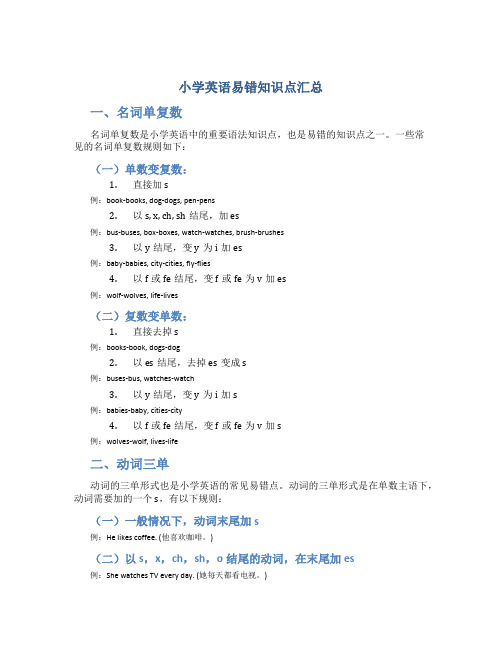
小学英语易错知识点汇总一、名词单复数名词单复数是小学英语中的重要语法知识点,也是易错的知识点之一。
一些常见的名词单复数规则如下:(一)单数变复数:1.直接加s例:book-books, dog-dogs, pen-pens2.以s, x, ch, sh结尾,加es例:bus-buses, box-boxes, watch-watches, brush-brushes3.以y结尾,变y为i加es例:baby-babies, city-cities, fly-flies4.以f或fe结尾,变f或fe为v加es例:wolf-wolves, life-lives(二)复数变单数:1.直接去掉s例:books-book, dogs-dog2.以es结尾,去掉es变成s例:buses-bus, watches-watch3.以y结尾,变y为i加s例:babies-baby, cities-city4.以f或fe结尾,变f或fe为v加s例:wolves-wolf, lives-life二、动词三单动词的三单形式也是小学英语的常见易错点。
动词的三单形式是在单数主语下,动词需要加的一个s,有以下规则:(一)一般情况下,动词末尾加s例:He likes coffee. (他喜欢咖啡。
)(二)以s,x,ch,sh,o结尾的动词,在末尾加es例:She watches TV every day. (她每天都看电视。
)(三)以辅音字母加y结尾的动词,变y为i,再加es例:He flies to Beijing tomorrow. (他明天飞往北京。
)三、时态小学英语中的时态也是一个常见易错点。
常见的英语时态有以下几种:(一)一般现在时表示经常或习惯性的动作,或者说是客观事实。
例:I usually go to school by bike. (我通常骑自行车去上学。
)(二)现在进行时表示现在正在进行的动作。
例:She is watching TV now. (她正在看电视。
六年级下unit 4 英语易错题
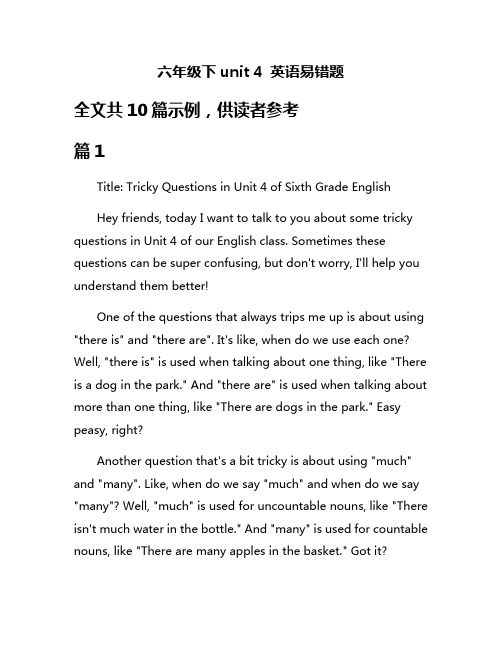
六年级下unit 4 英语易错题全文共10篇示例,供读者参考篇1Title: Tricky Questions in Unit 4 of Sixth Grade EnglishHey friends, today I want to talk to you about some tricky questions in Unit 4 of our English class. Sometimes these questions can be super confusing, but don't worry, I'll help you understand them better!One of the questions that always trips me up is about using "there is" and "there are". It's like, when do we use each one? Well, "there is" is used when talking about one thing, like "There is a dog in the park." And "there are" is used when talking about more than one thing, like "There are dogs in the park." Easy peasy, right?Another question that's a bit tricky is about using "much" and "many". Like, when do we say "much" and when do we say "many"? Well, "much" is used for uncountable nouns, like "There isn't much water in the bottle." And "many" is used for countable nouns, like "There are many apples in the basket." Got it?Oh, and don't forget about using "a" and "an"! Like, when do we use each one? We use "a" before words that start with a consonant sound, like "a cat", and we use "an" before words that start with a vowel sound, like "an apple". Remember, it's all about the sound, not the letter!There are so many other tricky questions in Unit 4, but don't worry, we can work together to understand them better. Just keep practicing and asking questions, and soon enough, they won't be so tricky anymore!So, keep up the good work, friends! We've got this! Let's ace Unit 4 together!篇2Unit 4 in the sixth grade is really tricky! There are so many words and grammar rules that can get mixed up easily. But don't worry, I'm here to help you understand and remember them better.One common mistake students make is mixing up "there", "their", and "they're". Remember, "there" is used to talk about a place or location, like "There is a cat on the roof". "Their" shows possession, like "Their cat is black". And "they're" is short for"they are", like "They're going to the park". So next time, double check which one to use depending on the situation.Another easy mistake is mixing up "your" and "you're". "Your" shows possession, like "Is this your book?". "You're" is short for "you are", like "You're my best friend". Remember the difference so you can use the right one in your sentences.Don't forget about the difference between "its" and "it's" too. "Its" shows possession, like "The dog wagged its tail". "It's" is short for "it is" or "it has", like "It's a beautiful day" or "It's been a long time". Pay attention to which one to use to avoid making this common mistake.Lastly, be careful with irregular verbs. Instead of adding "ed" to form past tense, they change completely. For example, "eat" becomes "ate", "drink" becomes "drank", and "go" becomes "went". Remember these irregular verbs so you can use them correctly in your sentences.So keep practicing and paying attention to these common mistakes in Unit 4. Soon, you'll be able to avoid them and become an English pro!篇3Hey guys! Today I want to talk to you about some tricky questions in Unit 4 of our English textbook. These questions always seem to trip us up, but if we pay attention and practice, we can totally ace them!First up, let's talk about irregular verbs. You know, those verbs that don't follow the regular pattern when we change them from present to past tense. Words like "go" becoming "went" or "eat" becoming "ate." They can be kind of confusing, but if we review them regularly, we'll get the hang of it!Next, let's chat about homophones. These are words that sound the same but have different meanings and spellings. Like "there," "their," and "they're." It's easy to mix them up, but if we remember their definitions, we'll know which one to use in a sentence.Another challenging topic is prepositions. These little words like "in," "on," and "at" can change the meaning of a sentence completely. Make sure you know when to use each one correctly to avoid confusion.Lastly, let's not forget about spelling rules. English spelling can be tricky, but if we remember common prefixes and suffixes, we can improve our spelling skills. Practice writing words with tricky spellings to become a spelling pro!So there you have it, guys! With a little bit of practice and attention to detail, we can conquer these tricky questions in Unit 4. Keep up the good work and don't get discouraged. We got this!篇4Hey guys, today I want to talk about some tricky questions in Unit 4 of our sixth grade English textbook. These questions always trip me up, so let's go over them together!First up, we have the difference between "its" and "it's." "Its" is used to show possession, like "The dog wagged its tail." Whereas "it's" is short for "it is" or "it has," like "It's raining outside." Remember, if you can replace the word with "it is" or "it has," then you should use "it's."Next, let's talk about homophones. Homophones are words that sound the same but have different meanings and spellings. For example, "their," "there," and "they're." "Their" shows possession, like "Their house is big." "There" refers to a place, like "I left my keys over there." And "they're" is short for "they are," like "They're going to the park."Another tricky one is the difference between "your" and "you're." "Your" shows possession, like "I like your new shoes.""You're" is short for "you are," like "You're my best friend." So remember, if you can replace the word with "you are," then you should use "you're."Last but not least, let's talk about using apostrophes in contractions. Contractions are when two words are combined and an apostrophe is used to show where letters have been left out. For example, "can't" is short for "cannot," "I'm" is short for "I am," and "won't" is short for "will not."So there you have it, some of the tricky questions in Unit 4 of our sixth grade English textbook. Remember to pay close attention to these rules and practice them regularly. Keep up the good work, and soon these questions won't be tricky anymore!篇5Hey guys! Today, let's talk about some tricky questions from Unit 4 in our sixth-grade English class. These questions can be a little bit confusing, so let's break them down together and make sure we understand them well.First, let's talk about the difference between "there," "their," and "they're." I know it can be easy to mix them up, but remember: "there" is used to show a place or location, like "over there." "Their" shows possession, like "their toys." And "they're"is a contraction for "they are," like "they're going to the park." So next time you see these words, think about their meanings and use the right one!Next, let's discuss the difference between "your" and "you're." This one is a little bit tricky too! "Your" shows possession, like "your book." And "you're" is a contraction for "you are," like "you're my best friend." So remember, if you can replace the word with "you are," then use "you're." If not, use "your."Another common mistake is mixing up "its" and "it's." "Its" shows possession for non-living things, like "the cat licked its paws." And "it's" is a contraction for "it is," like "it's raining outside." Just remember which one shows possession and which one is a contraction, and you'll be good to go!Lastly, let's talk about the differences between "to," "too," and "two." "To" is used for going somewhere or to show direction, like "let's go to the store." "Too" means "also" or "very," like "I want to go too." And "two" is the number 2, like "I have two dogs." So when you're writing, make sure to use the right one based on the context!I hope this little guide helps you understand these tricky questions better. Remember to pay attention to the details andmeanings of each word, so you can use them correctly in your writing and conversations. Keep practicing, and soon you'll be a pro at these tricky questions!篇6Hey guys, have you ever made mistakes when you're learning English? Don't worry, we all make mistakes sometimes! In this article, I'm going to talk about some common mistakes that sixth graders often make in Unit 4 of our English textbook. Let's learn from these mistakes together so we can improve our English skills!One common mistake that students make is mixing up words that sound similar but have different meanings. For example, some students get confused between "their," "there," and "they're." "Their" shows possession, like "that is their book." "There" refers to a place, such as "the park is over there." And "they're" is a contraction of "they are," as in "they're going to the store." So make sure to pay attention to the meanings of these words and use them correctly in your sentences.Another mistake that students often make is using the wrong verb tense. For example, some students might say "I go to the park yesterday," when the correct sentence is "I went to thepark yesterday." Remember to use past tense when talking about actions that have already happened.Additionally, many students struggle with spelling words correctly. It's important to practice spelling words regularly so you can avoid common spelling mistakes. For example, remember that "receive" has an "i" before the "e," and "definitely" has an "i" in the middle, not an "a."Lastly, some students have trouble with subject-verb agreement. Remember that the subject of a sentence must match the verb in terms of number. For example, "She dances" is correct because "she" is a singular subject, while "They dance" is correct because "they" is a plural subject.By being aware of these common mistakes and practicing them regularly, we can all improve our English skills and become better communicators. Let's keep learning and growing together!篇7Hey guys! Today I'm going to talk about some tricky questions in Unit 4 of our sixth grade English textbook. These questions can be a bit confusing, but don't worry, I'll explain them to you so you can get them right next time!One thing that often trips us up is the difference between "there," "their," and "they're." "There" is used to show a place, like "over there." "Their" shows possession, like "their house." And "they're" is a contraction of "they are," like "they're going to the park." Remember to pay attention to which one you use!Another common mistake is mixing up "your" and "you're." "Your" shows possession, like "your book." "You're" is a contraction of "you are," like "you're my friend." Make sure to double check which one you need in your sentence.Don't forget about "its" and "it's" too. "Its" shows possession, like "the cat licked its paw." "It's" is a contraction of "it is," like "it's a beautiful day." Pay attention to the apostrophe to make sure you're using the right one!Lastly, watch out for "too," "to," and "two." "Too" means also, like "I want to go too." "To" is a preposition, like "I'm going to the store." And "two" is the number 2, like "I have two dogs." Keep an eye on which one you need in your sentence!So remember, pay attention to homophones and contractions, make sure you're using the right one in each sentence, and you'll be acing those tricky questions in no time! Keep practicing, keep learning, and you'll do great!篇8Hi guys! Today, I want to talk to you about some easy mistakes in Unit 4 of our sixth grade English textbook. Let's dive right in!One common mistake is mixing up "your" and "you're." Remember, "your" shows possession (like, your book) and "you're" is short for "you are" (like, you're awesome!).Another tricky one is "their," "there," and "they're." "Their" shows possession (like, their dog), "there" refers to a place (like, over there), and "they're" is short for "they are" (like, they're going to the park).Don't forget about words that sound the same but are spelled differently, like "to," "too," and "two." "To" is used for going somewhere (like, let's go to the park), "too" means also (like, I want to go too), and "two" is the number 2.And let's not forget about "its" and "it's." "Its" shows possession (like, the cat licked its paws) and "it's" is short for "it is" or "it has" (like, it's raining outside).Lastly, watch out for "than" and "then." "Than" is used for comparisons (like, I am taller than you) and "then" is used to show time or order (like, first we eat dinner, then we play games).So, guys, keep practicing and pay attention to these common mistakes. You'll be an English pro in no time!篇9Hey guys,Today let's talk about some common mistakes that we might make in English. These mistakes are from Unit 4 of our sixth grade English textbook. Let's make sure we understand them so we can avoid them in the future!1. The difference between "there," "their," and "they're":- "There" is used to show a place or location.Example: The cat is over there.- "Their" shows possession, meaning it belongs to them.Example: That is their house.- "They're" is a contraction of "they are."Example: They're going to the park.2. The difference between "your" and "you're":- "Your" shows possession, meaning it belongs to you.Example: Is this your book?- "You're" is a contraction of "you are."Example: You're going to love the movie.3. The difference between "quiet" and "quite":- "Quiet" means there is no noise or it is peaceful.Example: The library is quiet.- "Quite" means very or a lot.Example: She was quite surprised by the news.4. Using the correct verb tense:- Make sure you use the correct verb tense in your sentences. For example, in the past tense, you should add "-ed" to regular verbs.Example: He played soccer yesterday.Remember these tips and keep practicing your English! Let's ace our next English test together. Good luck!篇10Hey guys! Today I want to talk to you about some easy mistakes we often make in Unit 4 of our sixth grade English book. Let's dive in and make sure we get it right next time!First mistake we make is mixing up "there," "their," and "they're." Remember, "there" refers to a place, like "over there." "Their" shows possession, like "their dog." And "they're" is short for "they are." So next time, think about which one makes the most sense in the sentence before you write it down.Another common mistake is mixing up "its" and "it's." "Its" shows possession, like "the cat licked its paw." And "it's" is short for "it is" or "it has," like "it's raining outside." Just remember to think about whether you need an apostrophe or not when you use these words.Next up, we sometimes get confused with "your" and "you're." "Your" shows possession, like "is that your book?" And "you're" is short for "you are." So make sure to double check which one you need before you write it down.Lastly, let's talk about using "a" and "an" before a word. Remember, we use "a" before words that start with a consonant sound, like "a cat." And we use "an" before words that start with a vowel sound, like "an apple." So pay attention to the sound at the beginning of the word when choosing between "a" and "an."Alright, that's all for today. Remember to practice and pay attention to these easy mistakes so we can all improve our English skills together. Thanks for listening!。
三年级下册英语+Unit+3_Unit+4+易错精析+易错考点集训+译林版三起(word版,含答案)

译林版三起三年级下册英语Unit 3~Unit 4易错精析 + 易错考点集训易错精析易错精析一:单项选择。
( ) 1. ________ a schoolbag over there?A.Is thisB.Is thatC.It’s易错解析:通过阅读句子可知,这是一个问句,故首先排除选项C。
然后再辨析句型“Is this ...?”和“Is that ...?”:“Is this ...?”用来询问距离说话人较近的物品的归属;“Is that ...?”用来询问距离说话人较远的物品的归属。
最后通过句中的关键词“over there(在那里)”可知,是询问距离说话人较远的物品的归属。
故答案选B。
(易错选A)( ) 2. —________ my schoolbag, Mum?—It’s in the box.A.Where’sB.What’sC.Is易错解析:通过阅读对话可知,上句是一个特殊疑问句,故首先排除选项C。
(因答语是一个陈述句,不是“Yes”或“No”能回答的一般疑问句。
)然后再分析答语:它在盒子里。
明确上句是在询问某物(我的书包)在哪里,句型结构为:Where is + 物品? 而Where is可以缩写为Where’s。
故答案选A。
(易错选B)( ) 3. The bird is ________ the tree.A.onB.inC./易错解析:本题考察“在树上”的不同译法:in the tree表达的是外来的事物落在树上;on thetree表达的是某物长在树上。
通过阅读句子得知,说的是鸟落在树上,应用in the tree。
故答案选B。
(易错选A)易错精析三:根据句意,选择恰当的单词补全句子。
—Is this _________ (your / you) bag?—Yes, it _________ (is / isn’t).易错解析:通过阅读对话可知,这是询问近处物品归属的句型。
人教PEP版五年级上册英语期末易错点强化卷(含答案)
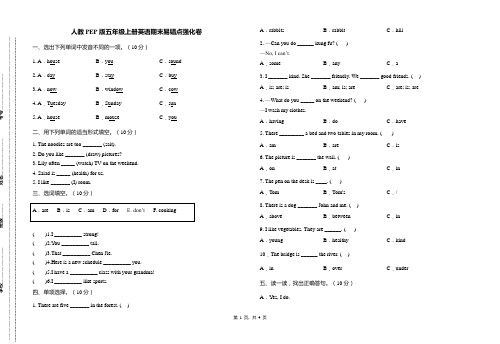
人教PEP 版五年级上册英语期末易错点强化卷一、选出下列单词中发音不同的一项。
(10分) 1. A .house B .you C .sound 2. A .day B .stay C .buy 3. A .now B .window C .cow 4. A .Tuesday B .Sunday C .sun 5. A .houseB .mouseC .you二、用下列单词的适当形式填空。
(10分) 1. The noodles are too _______ (salt). 2. Do you like _______ (draw) pictures? 3. Lily often _____ (watch) TV on the weekend. 4. Salad is _____ (health) for us. 5. I like _______ (I) room. 三、选词填空。
(10分)A .areB .isC .amD .for E. don’t F. cooking( )1.I __________ strong! ( )2.You __________ tall. ( )3.That __________ Chen Jie.( )4.Here is a new schedule __________ you. ( )5.I have a __________ class with your grandma! ( )6.I __________ like sports. 四、单项选择。
(10分)1. There are five _______ in the forest. ( )A .rabbitsB .rabbitC .hill2. —Can you do ______ kung fu? ( ) —No, I can’t. A .someB .anyC .a3. I _______ kind. She _______ friendly. We _______ good friends. ( ) A .is; are; isB .am; is; areC .are; is; are4. —What do you _____ on the weekend? ( ) —I wash my clothes. A .havingB .doC .have5. There _________ a bed and two tables in my room. ( ) A .amB .areC .is6. The picture is _______ the wall. ( ) A .onB .atC .in7. The pen on the desk is ____. ( ) A .TomB .Tom'sC ./8. There is a dog _______ John and me. ( ) A .aboveB .betweenC .in9. I like vegetables. They are ______. ( ) A .youngB .healthyC .kind10.The bridge is ______ the river. ( ) A .inB .overC .under五、读一读,找出正确答句。
最新北师大版英语四年级下册期末复习知识点归纳及易错题
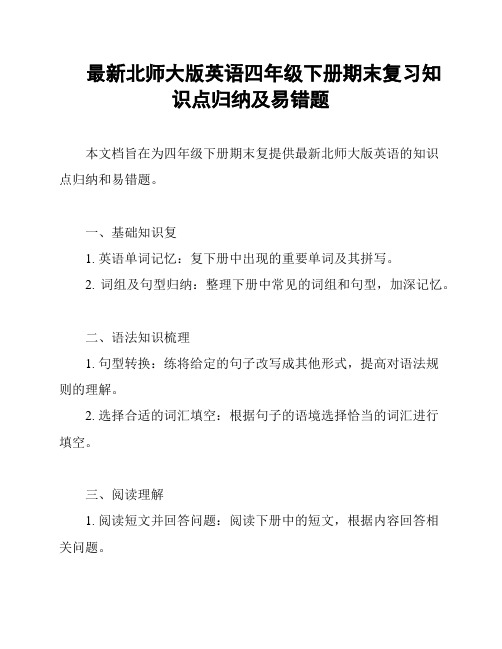
最新北师大版英语四年级下册期末复习知
识点归纳及易错题
本文档旨在为四年级下册期末复提供最新北师大版英语的知识
点归纳和易错题。
一、基础知识复
1. 英语单词记忆:复下册中出现的重要单词及其拼写。
2. 词组及句型归纳:整理下册中常见的词组和句型,加深记忆。
二、语法知识梳理
1. 句型转换:练将给定的句子改写成其他形式,提高对语法规
则的理解。
2. 选择合适的词汇填空:根据句子的语境选择恰当的词汇进行
填空。
三、阅读理解
1. 阅读短文并回答问题:阅读下册中的短文,根据内容回答相
关问题。
2. 根据短文填空:阅读短文后,根据短文内容选择适当的单词
填空。
四、易错题练
1. 动词时态:练根据句子的语境选择合适的动词时态。
2. 名词单复数:练根据句子的语境选择合适的名词单复数形式。
3. 选择合适的形容词:练根据句子的语境选择合适的形容词。
以上是最新北师大版英语四年级下册期末复习知识点归纳及易
错题的内容。
通过系统地进行复习和练习,相信能够提高你的英语
学习水平,取得好成绩。
祝你学习顺利!。
Unit1-Unit4易错语法知识点汇总练习(讲义)-译林版英语四年级下册

how形容词/副词+主谓!
解题方法:先找出句中的主语和谓语;在判断主语前面的单词的词性;若是名词,则用what;若是形容词/副词,则用how
考题精练:
一、单项选择
( )1.sunny day!Let'sgooutforawalk.
A. How aB. How C.What aD. What
( )4.Is it timethe PE lesson?
A.for B.to have C.A and B
( )5.It’s timeclass.Hurry up!
A.to B.for C.in
( )6.It’s timehave a PE lesson.Let’s go to the playground.
一、选择题
( )1. It's timeEnglish class.
A. to B. for C. with D. /
( )2. It's timehave lunch.
A. to B. for C. with D. /
( )3. It's time forto have a PE lesson.
A. her B. he C. hers D. his
A. haveB.to haveC. having
( )2.—I can't do it.—Lethelp you.
A. weB. meC.our
( )3.—Letplay football, Tom.—Great!
A. weB. theyC. us
( )4.—Letgo home.It’s late.—All right.
A.can B.don’t C.can’t
人教版PEP六年级英语上册单元知识重点重难易错训练-Unit 4 I have a pen pal

人教版PEP六年级英语上册Unit 4 I have a pen pal 单元知识重点及重难易错训练一、重点单词:studies学习(第三人称单数形式) puzzle谜 hiking远足二、习惯语搭配:read stories读故事 do kung fu练功夫 fly kites放风筝 play the pipa弹琵琶 play sports进行体育活动 climb mountains爬山 listen tomusic听音乐 sing English songs唱英文歌 on a farm在一个农场里 live in...住在··· write an email to...给···写一封电子邮件 on the playground在运动场上三、惯用表达式:Me too.我也是。
Really?真的吗?四、注意几个单词的变化:hobby(复数形式)—hobbies have to(同义词)—must五、重点语法知识:1、动词变为动名词的规则:动词变为动名词,即是动词加ing。
一般要遵循以下三条规则:(1)一般情况下,在动词的后面直接加ing。
如:play—playing read—reading do—doing go—going(2)以不发音的字母e结尾的动词,要去掉不发音的字母e,再加ing。
如:write—writing ride—riding make—making dance—dancing (3)以单元音加单辅音结尾的重读闭音节,要双写最后一个辅音字母,再加ing。
如:run—running swim—swimming put—putting sit—sitting2、动词变为第三人称单数形式的规则:(1)在一个句子中,如果主语人称既不是你,也不是我,而是另外的一个人,这时的人称叫做第三人称单数。
(2)在第三人称单词的句子中,动词要使用第三人称单词形式。
期末复习:Unit4(易错篇)英语五年级上册译林版(三起)
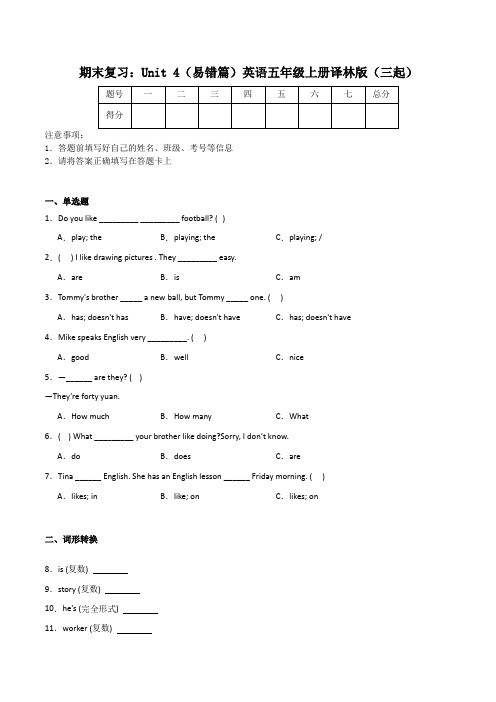
期末复习:Unit 4(易错篇)英语五年级上册译林版(三起)注意事项:1.答题前填写好自己的姓名、班级、考号等信息2.请将答案正确填写在答题卡上一、单选题1.Do you like _________ _________ football? ()A.play; the B.playing; the C.playing; /2.() I like drawing pictures . They _________ easy.A.are B.is C.am3.Tommy's brother _____ a new ball, but Tommy _____ one. ()A.has; doesn't has B.have; doesn't have C.has; doesn't have4.Mike speaks English very _________. ()A.good B.well C.nice5.—______ are they? ()—They’re forty yuan.A.How much B.How many C.What6.() What _________ your brother like doing?Sorry, I don’t know.A.do B.does C.are7.Tina ______ English. She has an English lesson ______ Friday morning. ()A.likes; in B.like; on C.likes; on二、词形转换12.go (第三人称单数)三、用单词正确形式填空四、中英文匹配17.cinema ( )18.bank ( )19.school ( )20.work ( )21.factory ( )22.study ( )五、句子匹配23.Are you good at playing football? ( )24.What do Lily’s parents like doing? ( )25.Do you like watching films? ( )26.What does Helen like doing? ( )27.Let’s go climbing on Sunday morning. ( )28.What do you usually do after school? ( )29.Does your aunt have any hobbies? ( )30.Can you play the guitar? ( )六、阅读选择My name is Tom. I’m a boy. I'm eleven. I live in Beijing with my father and mother. My father is a doctor and my mother is a teacher. I like Chinese food, but I can't cook. I have a nice bedroom. There's a bed, a desk and a chair in it. There are a lot of books on the desk. I like reading books. I often read books after school.31.Tom is ________. ()A.a boy B.eleven C.A and B32.He lives in Beijing with ________. ()A.his father B.his mother C.his parents33.Tom's mother is a ________. ()A.doctor B.teacher C.worker34.Tom likes ________. ()A.Chinese food B.reading books C.A and B七、阅读判断Hello, I’m Nancy. I’m from Canada. There are four people in my family. I am good at skating, but my sister isn’t. She likes cooking food. She cooks food very well. My parents like climbing. They usually climb in autumn. We have different hobbies.35.My sister likes cooking. ( )36.My parents like climbing in spring. ( )37.Nancy is an English girl. ( ) 38.Nancy is good at cooking. ( ) 39.Nancy’s sister is good at skating. ( ) 40.We have the same hobbies. ( )参考答案:1.C【详解】句意:你喜欢踢足球吗?踢足球play football,球类前不加任何限定词,like doing sth喜欢做某事,后跟动名词形式,故选C。
小学英语易错知识点汇总

《小学英语易错知识点汇总》引言:在小学英语的学习过程中,同学们常常会遇到一些容易犯错的知识点。
这些易错点如果不加以重视和纠正,可能会影响到同学们对英语的理解和运用。
为了帮助同学们更好地掌握小学英语,提高英语学习的效率,本文将对小学英语中的易错知识点进行汇总和分析。
一、名词的单复数1. 可数名词与不可数名词的区分很多同学在区分可数名词和不可数名词时容易出现错误。
可数名词可以用数目来计算,有单数和复数形式,如 book(书)、apple(苹果)等;不可数名词不能用数目来计算,没有复数形式,如 water(水)、milk(牛奶)等。
例如:I like apples.(正确)I like apple.(错误)2. 名词复数的变化规则(1)一般情况下,在名词词尾加 -s,如 book - books,desk - desks。
(2)以 s,x,sh,ch 结尾的名词,在词尾加 -es,如 bus - buses,box - boxes,brush - brushes,watch - watches。
(3)以“辅音字母+ y”结尾的名词,变 y 为 i 再加 -es,如 baby - babies,city - cities。
(4)以 f 或 fe 结尾的名词,变 f 或 fe 为 v 再加 -es,如 knife - knives,leaf - leaves。
例如:There are three buses in the street.(正确)There are three bus in the street.(错误)二、动词的形式1. be 动词的用法be 动词有 am,is,are 三种形式。
我(I)用 am,你(you)用 are,is 连着他(he)、她(she)、它(it);单数名词用 is,复数名词全用 are。
例如:I am a student.(正确)I is a student.(错误)They are teachers.(正确)They is teachers.(错误)2. 动词的第三人称单数形式在一般现在时中,当主语是第三人称单数(he,she,it,单个人名、地名、事物名称等)时,动词要用第三人称单数形式。
Module4语法易错+巩固练习-2023-2024学年六年级英语下册寒假自学课(外研版三起)

学问考点一:学问考点三:学问考点二:学问考点四:学问考点七:情态动词can的用法学问考点五:学问考点六:二、 选择题。
( )9.John gives this present _____ you. A .forB .of( )10.My mother is buying things _____ you.A .forB .of( )11.—______ is your father? —He is at home.A .WhoB .Where( )12.I like you and you like _____.A .IB .we( )13.The girl can't _________ the window.A .openB .opens( )14.He is _________ an egg.A .buyB .buys( )15._____ a tall building!A .HowB .WhatC .Where ( )16.She is buying things _______ your birthday.A .inB .forC .to ( )17.The apples are falling _______ the stairs.A .upB .downC ./ ( )18._______ a mess!A .WhatB .WhereC .How ( )19.She's _______ a cake for her son.A .makingB .makeC .made ( )20.The birds _____ singing in the tree.A .amB .isC .三、 用所给单词的适当形式填空。
21.These boxes are too heavy. Please come 四、 连词成句。
31.falling, The, down, the, oranges, stai rs, are (.)32.are, The, flying, balloons, away (.)33.can, box, this, I, carry (.)34.the, is, phone, He, on (.)35.carry, I, box, can, this (.)36.buying, for, is, birthday, She, things, your (.)37.your, it, on, I, bed, put(.)38.trying, get, bus, on, the, he, is, to (.) 39.falling, The, are, apples, the, stairs, down (.) 40.did, Mother’s Day, start, When (?) 五、 补全对话。
人教版(pep)小学英语四年级下学期期末专项练习四 易错题
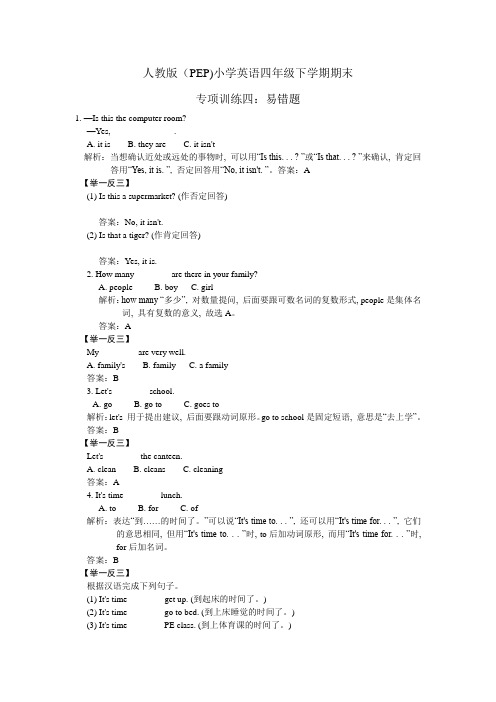
人教版(PEP)小学英语四年级下学期期末专项训练四:易错题1. —Is this the computer room?—Yes, ______________.A. it isB. they areC. it isn't解析:当想确认近处或远处的事物时, 可以用“Is this. . . ? ”或“Is that. . . ? ”来确认, 肯定回答用“Yes, it is. ”, 否定回答用“No, it isn't. ”。
答案:A【举一反三】(1) Is this a supermarket? (作否定回答)__________________________________答案:No, it isn't.(2) Is that a tiger? (作肯定回答)__________________________________答案:Yes, it is.2. How many ________are there in your family?A. peopleB. boyC. girl解析:how many “多少”, 对数量提问, 后面要跟可数名词的复数形式, people是集体名词, 具有复数的意义, 故选A。
答案:A【举一反三】My ________ are very well.A. family'sB. familyC. a family答案:B3. Let's ________school.A. goB. go toC. goes to解析:let's 用于提出建议, 后面要跟动词原形。
go to school是固定短语, 意思是“去上学”。
答案:B【举一反三】Let's________ the canteen.A. cleanB. cleansC. cleaning答案:A4. It's time________ lunch.A. toB. forC. of解析:表达“到……的时间了。
牛津译林英语-六年级下册-易错考点-分类练-(试题)-Unit4

牛津译林英语六年级下册易错考点分类练(试题)-Unit4 一.look 短语辨析1.To keep safe,you must cars and bikes.()A.look for B.look out forC.look after二.现在进行时2.﹣﹣What is Mike(do)?﹣﹣He is(walk)on the road.三.情态动词+动原3.A good student must ________in class.()A.listens to the teacherB.listening to teacherC.listen to the teacher4.You can on the pavement.()A.waiting B.waits C.waited D.wait四.系动词+形容词---系表结构。
5.your English ?()A.Do well B.Is well C.Is good五.情态动词词义辨析6.You ________watch TV.You ________go to bed now.It's too late.()A.can;must B.can't;mustC.mustn't;can7.1)You play football because you are sick.2)How you cross the road safely?3)You look at the traffic lights and wait for the green man.4)You play football on the road.5)You sit here,because it is for my sister.六.safe的用法8.Some children run on the road.This is not .()A.safety B.safely C.safe D.slowly 七.动副结构9.The drivers can see you .()A.easier B.easily C.easy10.How can we cross the road ?()A.safety B.safe C.safely11.We mustn't run on the road.()A.quick B.happy C.quickly D.slow 八.there be 句型12.There any traffic lights here three years ago.()A.are B.aren't C.isn't D.weren't 九.对话排序13.将下列句子排列成一段通顺的对话Shall we go by bike?Let's go now.Great! But how can we get there?Where are you going,Sam?No,it's too slow.Let's go by bus.I'm going to the cinema.Do you want to go with me?All right.Buses go fast.一十.英文常识14.﹣﹣Where do people drive on the left side of the road in China?﹣﹣In .()A.Beijing B.Shanghai C.Hangzhou D.Hong Kong 15.In the United States,people drive on the side of the road.()A.right B.left C.middle D.beside一十一.汉译英----单词+形式16.﹣﹣这些小汽车为什么停下来?﹣﹣看红灯.它意味着我们必须停下来.﹣﹣Why the cars?﹣﹣Look at the red light.It means we.17.你怎样才能安全地穿过马路?How you the road?18.你们在马路上禁止做什么?What must you on the?19.﹣﹣﹣你能看见绿灯吗?﹣﹣﹣是的.你现在可以穿过马路.﹣﹣﹣you the green man?﹣﹣﹣Yes.You can cross the now.20.﹣﹣﹣安全过马路你必须做什么?﹣﹣﹣我们必须看交通信号灯.﹣﹣﹣What you do to the road?﹣﹣﹣We must the traffic lights.21.﹣﹣﹣安全过马路你禁止做什么?﹣﹣﹣我们禁止在马路上跑.﹣﹣﹣What you not do to the road?﹣﹣﹣We on the road.22.﹣﹣我们怎样到达医院?﹣﹣乘坐出租车.﹣﹣How we the hospital?﹣﹣.23.为了保持安全,你可以在人行道上等待并且当心小汽车.To,you can on the pavement and cars.一十二.短语翻译24.(1)停下等候(2)他们去看望他们的阿姨.(3)我们怎样到达你家?(4)马路上有如此多的小汽车.(5)公交车为什么停在这里?。
小升初强化训练四(试题)-2023-2024学年译林版(三起)英语六年级下册

小升初强化训练四一、根据括号内的中文提示,完成句子。
1.Sam (没有健康的饮食).He always (一次吃太多肉).2. you (你每天需要吃几个鸡蛋) every day?3.The girl (只吃一点点甜食) to (保持健康).4.There (几个芒果和一些面包) in the fridge yesterday.5. (睡前刷牙)is good for our teeth.6. (当心), the cars (开得很快)on the road.7. (为了保证安全), we should (遵守交通规则)。
8.To (安全地过马路),we must (首先找斑马线) and then (看交通信号灯).9.The red man is on. Let’s (在人行道上等待).10.Tom, (保持安静)in the library, we mustn’t (大声讲话).二、选择划线部分读音不相同的单词,写在横线上.1. __________ “It's often cloudy in my country.” said the young girl.2. __________ There is a bear in the forest. It has two small ears.3. __________ Does everybody know how to draw snow?4. __________ I took some photos of the park a moment ago.5. __________The students are busy writing about their dreams on the computer.6. __________ The twins sisters’ birthday is on the twelfth of May.7. __________ My mother cooked some noodles this afternoon.三、用单词的适当形式填空。
小学英语牛津译林英语 六年级下册 易错考点 分类练 (答案详解)-Unit4

牛津译林英语六年级下册易错考点分类练-Unit4答案详解)一.oo 短语辨析1.To eeut car and bie.()A.oo for B.oo out forC.oo after参考译文:为了保证安全,你必须提防小汽车和自行车.易错点睛:该题考查短语运用.oo for寻找,oo out for提防,小心,oo after照看.根据"To eeut ________in ca.()A.iten to the teacherB.itening to teacherC.iten to the teacher参考译文:一个好学生,上课必须认真听讲。
易错点睛:考点一:mut动词原形。
考点二听老师讲课:iten to the teacher 所以选:C4.You can on the ent.()A.waiting B.wait C.waited D.wait参考译文:你可以在人行道上等.易错点睛:考查动词原形.由题,句中使用情态动词can,后面要搭配动词原形,即wait"等待".所以选:D.四.系动词形容词---系表结构。
5.our Engih ?()A.Do we B.I we C.I good参考译文:你的英语好吗?易错点睛:该题考查系动词和形容词.分析题干可知,这是一个一般疑问句,主语是our Engih看做第三人称单数,句子中出现固定短语be good at"擅长于",根据主谓一致原则,系动词用i,提到句首,首字母大写.第二个空,缺少形容词good.所以选:C.五.情态动词词义辨析6.You ________watch TV.You ________go to bed now.It' too ate.()A.can;mut B.can't;mutC.mutn't;can参考译文:你不能看电视。
你现在必须睡觉。
太晚了。
- 1、下载文档前请自行甄别文档内容的完整性,平台不提供额外的编辑、内容补充、找答案等附加服务。
- 2、"仅部分预览"的文档,不可在线预览部分如存在完整性等问题,可反馈申请退款(可完整预览的文档不适用该条件!)。
- 3、如文档侵犯您的权益,请联系客服反馈,我们会尽快为您处理(人工客服工作时间:9:00-18:30)。
小学英语易错知识点强化训练篇(四)(91题-128题)英语学习需要循序渐进,逐渐积累。
其中容易混淆、容易出错、让孩子觉得似是而非的的知识点很多。
以下习题为第91题-128题,纯手打。
由浅入深,附答案解析,供小学生练习、提高使用。
91、你告诉同学你最喜欢夏天是因为你可以:()A.go swimming in the sea B.go for a walk in a park C.swing in a park答案: A解析:本试题考察对于情景用语的理解。
当别人问你为什么最喜欢夏天时,要回答在夏天可以做的有趣的事情。
A 项在海边游泳,B 项在公园散步C 项在公园游泳。
B 项在一年四季都可以做,不符合题意。
C 项不符合常识。
因此选择 A 项。
92.当别人问你的生日是什么时候时,你会说:()A.My birthday is in May. B.My birthday May. C.My birthday may 5th.答案:A解析:对生日进行回答,首先要保证句子完整。
A 句子完整,我的生日在5 月。
B 项和C 项都没有系动词。
因此选择A93、你看到两只猴子在打架时应说:()A.They is fighting. B.The monkeys is fighting. C.The monkeys are fighting.答案:C解析:试题考察孩子对于情景用语的理解。
首先两只猴子应该用复数,A 选项是主系表,而 C 选项monkeys 是复数,所以选C。
94.每天上午9:30 你和同学们一起在()A.have English class B.play sports C.do morning exercises答案:B解析:have English class 缺少冠词an, 因为时间是上午,所以do morning exercises 不适合语境,而play sports 做运动符合语境,因此选择 B 选项。
95、用所给单词的正确形式填空。
(1). A team has many_____ ( play ).(2). Look! I am _____ (throw) the ball to Kitty.答案:(1). players (2). throwing解析:本试题考察词的变化。
(1). many 许多的,后边接名词复数。
play 是动词,玩,名词形式是player,运动员,复数形式是players。
因此这个空填players。
“一个队中有许多运动员”。
(2).看look,提示这个句子用现在进行时,现在进行时的表现形式是be+doing.因此throw 的现在进行时是throwing。
这句话的意思是看,我正向凯蒂扔球。
96、用所给单词的正确形式填空。
(1). The _________ (five) animal is a dragon.(2). Last year _________ (is) the year of the pig.答案:(1). fifth (2). was解析:本试题考察词性变化。
(1). 首先分析题意”第五个动物是龙”,原词five 是基数词,表达数字“五”,第五个是序数词“fifth”,因此本题词形变化填”fifth“。
(2). “上一年是猪年“,题中last year 去年,上一年,提示本题时态是一般过去时,”is “的一般过去式是”was”,因此本题填“was”.97、用所给单词的正确形式填空。
(1). I'm __________ (clean) the living room.(2). Everyone __________ (put) on new clothes today.答案:(1). cleaning (2). puts解析:试题考察词的变化。
(1). 我正在打扫客厅。
此题有be 动词,那么有两种可能性:一种是时态的考查题,另一种是主系表句子结构的考察,“clean”动词,表示打扫,清洁。
显然是是考察时态的问题,因此结合句义,此题强调现在进行时,现在进行时的结构是be+doing,因此此题填“cleaning”。
(2).everyone 每个人,作主语谓语动词用单三,put 应该写成”puts”.98、用所给单词的正确形式填空。
(1). Jenny has some (flag) in her hand.(2). We are (make) cookies now.答案:(1). flags (2). making解析:本试题考察词的变化。
(1). “杰妮有一些旗子在手中。
”some 后边接名词复数,因此flag 的复数形式是flags。
(2).“我们正在做曲奇饼“,now 提示此题是现在进行时,因此此题填making。
99. I have three pen pals. One is , the other two are .A. Japanese; AmericaB. English; FrenchmenC. Canada; AustraliaD. Russian; Germany答案:B解析:试题考察名词的不规则变化。
1.本题的题意是“我有三个笔友,一个是...国人,另外两个是.....国人。
”注意后边一个空要用名词的复数形式。
整理题中出现的国家和国家的人的正确表示方式:Japanese (日本人);Japan ( 日本) American ( 美国人);America(美国)British/English (英国人);UK (英国)French/Frenchman(法国人) ;France(法国);Canadian(加拿大人);Canada (加拿大);Russian (俄罗斯人);Russia (俄罗斯);German(德国人);Germany(德国);Australian(澳大利亚人);Australia (澳大利亚)。
因此这道题只有 B 选项是全部正确的。
注意Frenchman 的复数形式是Frenchmen100. Do you know how many a horse has and how many a bee (蜜蜂) has?A. teeth; feetB. tooth; footC. tooth; feetD. teeth; foot答案:A解析:“你知道马有多少颗牙齿,蜜蜂有多少只脚?”这句话中的how many 用来修饰可数名词复数。
而选项中的牙齿tooth 和脚foot,都是名词原形。
tooth n.牙齿,它的复数形式是teeth,foot n 脚,它的复数形式是feet。
因此这道题选择 A 选项。
本题考查的是不规则名词的复数形式:分为四种情况:变内部元音字母:foot—feet(脚)/ goose—geese(鹅)tooth—teeth( 牙齿) / man—men (男人)单复同形:(单数形式)fish(鱼), sheep (绵羊), Chinese (中国人),Japanese(日本人), deer( 小鹿)单复同形:(复数形式)works (工厂,作品)/ means (方式,方法)完全不规则:child-children (孩子)/ mouse-mice (老鼠)penny-pence (英便士)101. Look at these of .A. photos; potatosB. photoes; potatoesC. photoes; potatosD. photos; potatoes答案:D解析:“看这些西红柿的照片。
”these 这些,后边要接名词复数,photo 的复数是photos,选项中的potato 的复数形式是potatoes. 因此这道题选择D。
102. Uncle Wang bought two for me yesterday.A. breadB. milkC. dictionaryD. watches答案:D解析:“昨天王先生给我买了两个_____。
”two, 提示后边接名词的复数。
bread 和water 都是不可数名词,dictionary 的名词复数是dictionaries,因此只有watch 的复数watches 是正确的,因此选择 D 选项。
103.--- Can you see the picture clearly?--- Yes. There are many in it.A. flowerB. grassC. fishD. car答案:C解析:你能清楚的看见这幅图片吗?是的,有许多…在里面。
many 后边接可数名词复数, flower 的复数是flowers,grass 是不可数名词,car 的复数是cars, fish 用作可数名词,指“鱼的条数”时单、复数同形;,指“鱼的种类”时的复数形式才为fishes;fish 作鱼肉讲时不可数。
因此此题选C。
104. Do you like best of all the vegetables? A. potatoes B. tomato C. breads D. rice答案: A解析:所有的蔬菜中你最喜欢哪种蔬菜?这道题中说类别要么用the+名词, 要么用名词复数。
A.选项potatoes 是potato 的复数。
B.tomato 的复数是tomatoes。
C. bread 和rice 是粮食,是不可数名词。
所以 A 正确105.I think should not be allowed to drive.A. sixteen years oldB. sixteen-year-oldC. sixteen-year-olds答案:C解析:“我认为16 岁的青少年不应该被允许驾驶。
”题中空格部分想要表示十六岁的青少年,表示一类人,十六岁的正确表达方法是sixteen-year-old,加“s”表示一类人,因此这道题选C。
106.The of the cottage were covered with .A. roofs; leafsB. roofs; leavesC. roves; leafsD. roves; leaves答案: B解析:本题主要考察可数名词。
“这个小屋的屋顶们都被树叶覆盖住。
”were 提示此题的主语是复数,被树叶覆盖那么树叶很多绝不是一片树叶,因此也应该用复数。
根据选项roof 屋顶,复数形式是roofs, leaf 树叶的复数是leaves,因此这道题选择 B 选项。
107 . Five were lost in the spacecraft accident.A. LifeB. livesC. lifesD. live答案:B解析:“五人在太空船事故中丧生。
